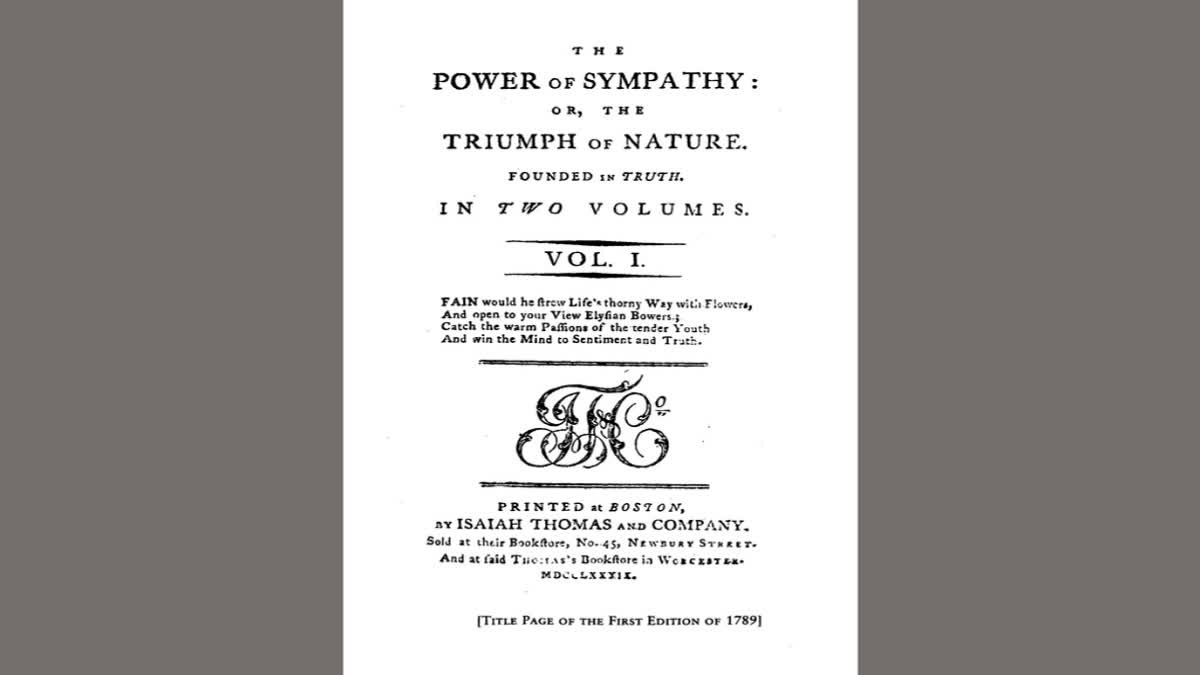New York: In the winter of 1789, around the time George Washington was elected the country's first president, a Boston-based printer quietly launched another American institution.
William Hill Brown's “The Power of Sympathy,” published anonymously by Isaiah Thomas & Company, is widely cited as something momentous: the first American novel.
Around 100 pages long, Brown's narrative tells of two young New Englanders whose love affair abruptly and tragically ends when they learn a shocking secret that makes their relationship unbearable. The dedication page, addressed to the “Young Ladies of United Columbia” (the United States), promised an exposé of “the Fatal consequences of Seduction” and a prescription for the "Economy of Human Life."
Outside of Boston society, though, few would have known or cared whether “The Power of Sympathy” marked any kind of literary milestone. “If you picked 10 random citizens, I doubt it would have mattered to any of them,” says David Lawrimore, an associate professor of English at the University of Idaho who has written often about early U.S. literature. “Most people weren't thinking about the first American novel.”
What the first American novel was like
Subtitled “The Triumph of Nature. Founded in Truth,” Brown's book is in many ways characteristic of the era, whether its epistolary format, its Anglicized prose, its unidentified author, or its pious message. But “The Power of Sympathy” also includes themes that reflected the aspirations and anxieties of a young country and still resonate now.
Dana McClain, an assistant professor of English at Holy Family University, notes that Brown was an outspoken Federalist, believing in a strong national government, and shared his contemporaries' preoccupation with forging how a stable republican citizenry. The letters in “The Power of Sympathy” include reflections on class, temperament and the differences between North and South, notably the “aristocratic temper” of Southern slave holders that endangered “domestic quietude," as if anticipating the next century's Civil War.
Like many other early American writers, fiction and nonfiction, Brown tied the behavior of women to the fate of the larger society. The novel's correspondents fret about the destabilizing “power of “pleasure” and how female envy “inundates the land with a flood of scandal.” Virtue is likened to a “mighty river” that "fertilizes the country through which it passes and increases in magnitude and force until it empty itself into the ocean.”
Brown also examines at length the ways novels might be a path to corruption or a vehicle to uplift, mirroring current debates over the banning and restrictions of books in schools and libraries.
“Most of the novels with which our female libraries are overrun are built upon on a foundation not always placed on strict morality, and in the pursuit of objects not always probable or praiseworthy,” one of Brown's characters warns. “Novels, not regulated on the chaste principles of true friendship, rational love, and connubial duty, appear to me totally unfit to form the minds of women, of friends, or of wives.”
Brown was likely more interested in shaping minds than in literary glory. “The Great American Novel” is a favourite catchphrase but wasn't coined until the 1860s. During Brown's lifetime, novels were a relatively crude art form and were valued mostly for satire, light entertainment or moral instruction. Few writers identified themselves as “novelists”: Brown was known as a poet, and essayist and the composer of an opera.
